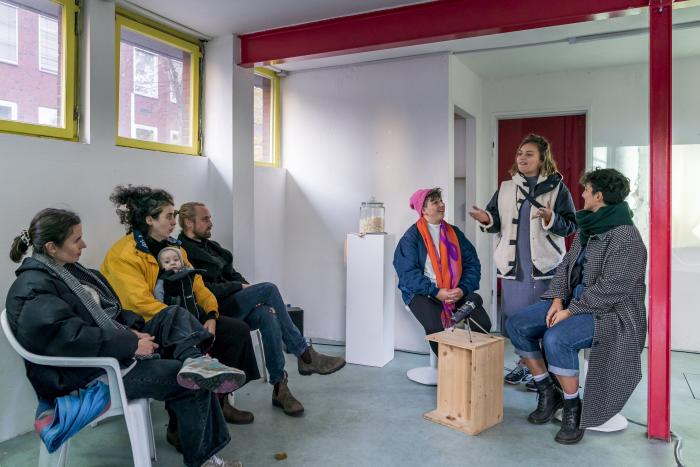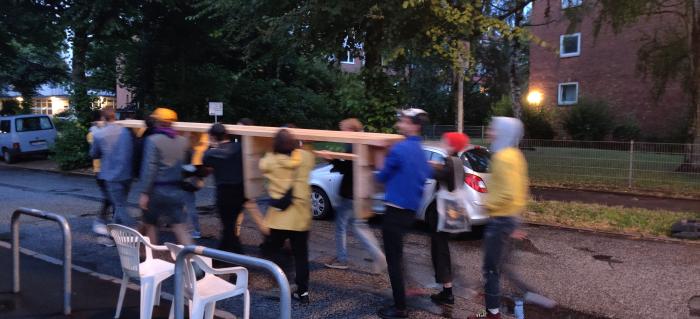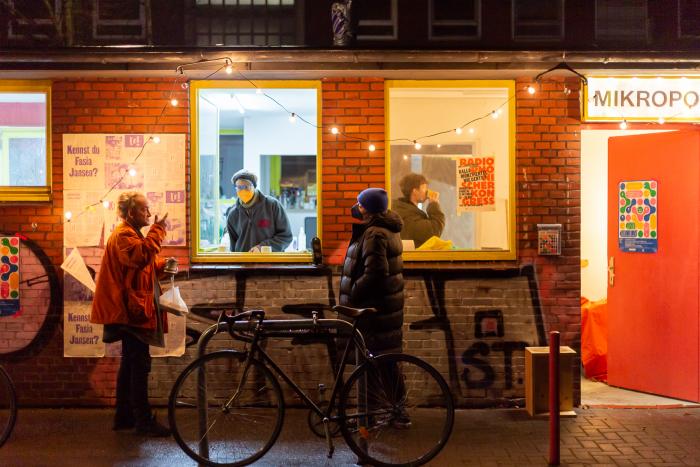Mikropol is a former toilet house converted into a self-organized place in Hamburg's East due to the closing of the former community center. The 50m2 space hosts events "by neighbors for neighbors" and the program of the curatorial team, which regularly situates activities in and around the building to engage with urban political discourses and put these into practice. Mikropol is a community center, a performative planning process and a built argument for a neighborhood action center in one.
The district Rothenburgsort in Hamburg's east is the subject of major urban change with structural and social consequences. After the closure of the neighborhood center without any alternatives, a group of neighbors has formed, meeting regularly at the market square and discussing the future of their neighborhood. From the meetings on the square emerged the idea not only to demand a new neighborhood action center but also to develop it collectively. The goal is to find a new site, where the various socio-cultural uses of the former center alongside new uses can be accommodated with a long-term perspective. As a first step, neighbors and supporters established the non-profit organization Mikropol and opened the former toilet house in the district's center to the public to situate the process. After the conversion of the building, which was abandoned for many years, the place now functions as a test space, planning office, and expression of neighborhood interests to screenplay how a future neighborhood action center in Rothenburgsort can be organized and could look like. It quickly became apparent that there is a great need for space in Rothenburgsort and that Mikropol's current 50m2 space can only partially satisfy the many needs of the inhabitants. Since then, the network around Mikropol has continuously expanded, and a coalition of different actors has formed, working collectively to find and create a permanent space for the needs of the residents.
Please highlight how the concept/idea can be exemplary in this context
Land in cities like Hamburg is rare, especially for socio-cultural use. However, Rothenburgsort, with its manufactural and industrial history, has the opportunity to give local users such as artists' groups, a theater, a food bank, a bicycle repair collective, a tenant counseling, and many more, room in the existing built environment. Former industrial buildings of the harbor, in particular, require a new purpose. In view of the enormous emissions from the construction sector and the far-reaching urban development plans for Hamburg's east, Rothenburgsort's existing vacant buildings must be reimagined and repurposed. Mikropol thus calls for the repurposing of existing built structures to accommodate various local actors who are in a precarious nomadic situation. With the transformation of the former toilet house into the neighborhood space, Mikropol has already done the first step in successfully repurposing a building on a small scale. Mikropol is an outstanding example that shows ways of rethinking urban space and giving it a new function. Opening Mikropol for neighborhood activities not only gives the place a new social meaning but also re-opens a building that was already public in its former sense. Bringing actors together and forming a coalition of urban change-makers creates a closely-knit network for a long-term impact on the neighborhood. Hence, Mikropol has the potential to function as a platform for knowledge transfer to accompany the socially and ecologically sustainable transition of the district. The next step must thus be the conversion and opening of vacant spaces on a larger scale for permanently affordable cultural, social and productive spaces.
Please highlight how the concept/idea can be exemplary in this context
The design aspect was an essential part of the process from the very beginning. The boundaries between the physical implementation and the design process are fluid. Because of the collective construction of Mikropol, the many alliances and collaborations in the neighborhood were strengthened and further expanded. Working together during the construction process has brought the community closer together and will continue to do so in future projects. Through the cooperation with the Neue öffentliche Gestaltungsberatung St. Pauli (New Public Design Consultancy St. Pauli), Mikropol becomes a place from where everyday problems and neighborhood concerns can be discussed and solved together, even beyond Rothenburgsort. Mikropol is a platform for community activities and negotiations of space and, at the same time, the physical realization of a tangible place that expresses the needs of inhabitants. The goal is to create and provide a non-(pre-)defined space that allows various uses. The open space allows for constant dialogue and is, at the same time, a statement about the lack of space for socio-cultural use in the district. Opening the building to the public also requires a physically opening of the space to the neighborhood. One approach was to open the space to the outside by a yellow roll-up door. The opportunity to open the room connects the exterior and interior uses and lowers the threshold for new users.
Please highlight how the concept/idea can be exemplary in this context
Mikropol is a neighborhood space and community-based design process in one that is formed through the engagement of neighbors and supporters in Rothenburgsort. It is an exceptional space that localizes and expresses the diverse needs of residents in an ongoing process. Mikropol as a mock-up translates on a 1:1 scale the performative planning process into reality through collective action. In doing so, planning is detached from the established technical language and made accessible to the actual experts who use the city on a daily basis.
"Start a revolution, get to know your neighbor" is the slogan for the place of exchange, solidarity and collective action. The number of activities offered by "neighbors for neighbors" is constantly growing and ranges from tea drinking, concerts, discussion events and exhibitions to choir rehearsals, radio shows, gardening and a free boutique. Mikropol primarily provides the space, while the activities are mainly self-organized. Anyone who wants to use the space can do so for free - the only condition is that the event is public and non-commercial. In addition to the "neighbors for neighbors" program, Mikropol's curatorial team creates additional events and settings in and around the building embedded in urban political discourses. Mikropol is self-organized and not bound to any public institution. Through its open character, the place brings different people together, creates a unique network of citizens' engagement in the neighborhood, and thus continuously establishes new forms of social relations within an urban process. In view of the far-reaching urban development plans and the already perceptible changes in Hamburg's east, such a place that situates the challenges and expresses the needs of local residents is essential.
Please highlight how this approach can be exemplary
The project Mikropol permanently opens a place to the public that previously stood empty for years. Repurposing an existing building is a careful use of limited resources and shows opportunities that can be a model for similar places. The unlimited lease agreement further allows to build a sustainable network and create a place that reflects the needs of the neighbors in the long term. At Mikropol, a diverse group of people meets, collectively discusses the future of their neighborhood and engages actively in urban political discourses. The process is an exceptional example of citizens taking the initiative to shape their city. The non-profit status of the association allows all users to use the space free of charge, which gives easy access for the more vulnerable. At the same time, cooperation with scientific institutions such as the HafenCity University or the University of Fine Arts of Hamburg (HfBK) provides access to knowledge and resources that support and reflects the bottom-up process.
Furthermore, the design ambition to create an open space that blurs the boundaries between indoor and outdoor, the urban environment and the space itself was a given from the beginning. This also constitutes itself in Mikropol’s interior design, which should be flexibly movable, meet the different uses and function as a storage for the uses of the neighborhood.
Mikropol shows new ways of collective urban design. The network of diverse actors formed by the joint work, in and around Mikropol, uniquely represents the needs of the residents. Rarely do institutions such as universities, local associations and groups, neighbors, local entrepreneurs, artists and activists succeed in forming a platform to collectively shape the still uncertain future of their neighborhood as they do in Rothenburgsort. The actual site demonstrates the importance of locating and spatializing residents' needs and challenges. Spatializing the process lets vulnerable people in particular be part of the urban process and co-design it. Mikropol is thus a model for co-designing local processes for socio-cultural uses in search of long-term perspectives in an existing urban fabric.
The ongoing process with the aim of finding a suitable property for permanent use for people from Rothenburgsort will continue. A detailed concept for the use of a vacant property in the close proximity of Mikropol has already been drawn up with various stakeholders. However, the implementation of this concept still requires further negotiations and political will. To get closer to the goal of collectively self-organized community spaces, the process series "start a revolution, get to know your neighbor" will be further expanded to create new situations. Additionally, new cooperations with artists and urban changemakers will support the idea of an agenda for sustainable urban development. Greater attention will also be given to the documentation and monitoring of the past and coming process. This will also be linked and expanded within existing structures of Mikropol such as the radio program "Radiopol", but new forms such as the district magazine "Mikropolitan" are also planned for the future.
Mikropol is already a member of the Urbane Liga, a national network of young urban-changemakers in Germany. Being awarded the New European Bauhaus Prize would allow Mikropol to take further steps and be part of international knowledge exchange in urban practices. The award would mean an important step in legitimizing the process, and the jury's recognition would give the project a new standing in Hamburg's urban development agenda.
Furthermore, the award would be an important support to further transform the building in a sustainable matter. The planning office - the building of Mikropol - requires investments in sustainable heating and electricity systems in order to be able to spatialize the process in a cost-effective and energy-efficient way. In addition to technical issues, social aspects of the energy transition, such as energy poverty and democracy, are to be addressed within the framework of Mikropol. In this way, Mikropol can contribute to the renewable energy transition and function as a starting point for addressing energy issues in the district. Mikropol's network provides a unique opportunity for knowledge transfer. In the sense of a 'one-stop-shop', Mikropol could thus become both a model and a contact point for local energy questions. Especially for energy questions, the knowledge and support of the New European Bauhaus initiative are particularly important.
@Zander, 2022
Content licensed to the European Union.



